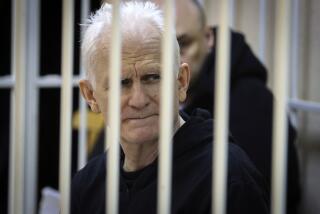Poland Frees Activist Solidarity Adviser
- Share via
WARSAW — Adam Michnik, one of Poland’s leading dissident intellectuals, was released from prison Monday under a government amnesty, an opposition activist in Warsaw said.
Michnik, a senior adviser to Solidarity, the outlawed free trade union, was serving a 2 1/2-year prison sentence for illegal union activity and inciting public unrest. The charges stemmed from Solidarity’s efforts to organize a 15-minute general strike in February of 1985.
Jacek Kuron, a prominent political activist in Warsaw, said Michnik telephoned him Monday evening to say that he had been freed. Michnik was said to have gone directly from Barczewo Prison in northern Poland to a friend’s apartment in Sopot, a Baltic Sea resort near Gdansk, and was not available for comment.
His release is seen by Western diplomats as part of an effort by the Polish leader, Gen. Wojciech Jaruzelski, not only to win a measure of popular acceptance at home but to bolster Poland’s image in the eyes of Western governments. One of Warsaw’s major goals is to rebuild its ruptured trade ties with the West in an effort to stem the growth of the country’s $31.3-billion debt.
Michnik, 39, a historian, has drawn worldwide attention in recent years as a calm and trenchant exponent of democratic reform in Communist Poland. He was the second prominent activist to be released under an act of clemency that took effect on July 23, the third such amnesty the Polish authorities have adopted in four years.
Bogdan Lis, a blue-collar worker who served as deputy chairman of Solidarity’s Gdansk organization in 1980-81, helped set up the movement’s underground structure after martial law was imposed in 1981. Lis was released from the same prison on July 21.
Michnik, Lis and a third activist, Wladyslaw Frasyniuk, were arrested in February of 1985 after a meeting with Solidarity founder Lech Walesa. The authorities said the meeting was held to organize a 15-minute general strike to protest a government plan to raise food prices. The strike was called off when the government appeared to reconsider its plan.
The authorities later went ahead with the price increases, stretching them out over several additional months, and put Lis, Michnik and Frasyniuk on trial in June of 1985.
European diplomats said that Italian Prime Minister Bettino Craxi had taken a particular interest in Michnik’s case. These sources said his release may help open the way to an official visit to Rome that Jaruzelski has long sought in his campaign to break the political quarantine a number of Western governments imposed after he led the martial-law suppression of the Soviet Bloc’s first independent labor union in 1981.
A trip to Rome would almost certainly include talks with Pope John Paul II, who is expected to visit his Polish homeland again next June. A Vatican reception for Jaruzelski would have significant public relations value in a Roman Catholic Poland still deeply skeptical of his intentions.
In turn, it could help iron out disagreements between the church and state over the Pope’s itinerary next year. The church would like to include Gdansk, the birthplace of Solidarity, where the bonds among faith, patriotism and the banned labor union are particularly intense. The state would prefer to avoid a papal appearance anywhere near the highly politicized Gdansk shipyards, where Walesa still works as an electrician.
A Polish news agency report Monday night said that more than 9,000 people have been released under the current amnesty. Virtually all are petty criminals. The report made no mention of Michnik, who was among the best-known of an estimated 350 political prisoners in Poland.
More to Read
Sign up for Essential California
The most important California stories and recommendations in your inbox every morning.
You may occasionally receive promotional content from the Los Angeles Times.










